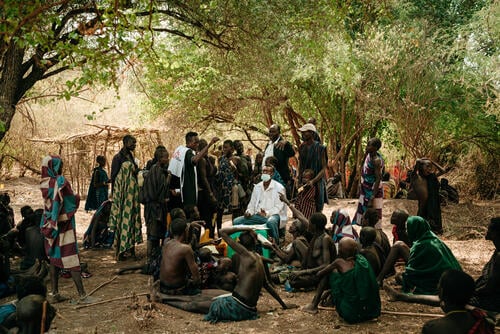Cholera is an acute bacterial infection caused by ingesting food or water contaminated with the bacterium Vibrio cholerae. The disease spreads quickly in places without clean water or proper sanitation, causing severe diarrhoea that can kill within hours if left untreated.
With prompt treatment, more than 99 per cent of patients make a full recovery. But despite being preventable, deaths from cholera are on the rise across the Horn of Africa.
The driving factors for the spread of cholera include overcrowding, poor living conditions, water scarcity and poor water quality, as well as a lack of proper sanitation, waste management facilities and water treatment options.
Current cholera outbreaks in the Horn of Africa are among the longest outbreaks ever recorded in the region.Samreen Hussain, MSF medical coordinator in Ethiopia
Recent outbreaks have added to the hardships of people in a region where malnutrition levels are consistently alarming, disease outbreaks are frequent, and people are often forced to relocate, driving cross-border transmission of the disease.
Conflict and climate shocks
Conflict and insecurity affect many of the areas that have recently experienced cholera outbreaks in the Horn of Africa. Conflict can cause damage to infrastructure and prevent people from reaching the services and healthcare they previously had access to.
Conflict and insecurity also force people to flee their homes, frequently leaving them in crowded makeshift shelters with little access to clean water and proper sanitation.
The increased movement of people is also due to climate shocks, such as severe drought and flooding. A deadly mix of climate-related factors in the Horn of Africa has contributed to the spread of cholera.
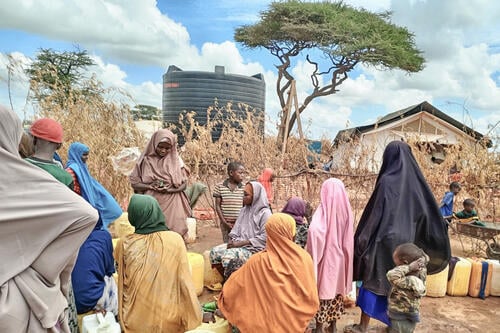
As a climate-sensitive disease, cholera becomes more prevalent when temperatures are high and rainfall conditions are changing. The onset of the El Niño phenomenon (warming of the sea surface temperature that occurs every few years) is likely to exacerbate the problem in east Africa, bringing with it shifts in rainfall patterns and a heightened vulnerability to flooding.
Nomadic pastoralist communities have been particularly affected by climate shocks. Many have lost their livestock and livelihoods to drought and floods, pushing them to move into urban areas, which increases the pressure on already limited essential services.
Often living conditions of internally displaced people in cities are overcrowded and insanitary, and meeting even minimum standards of hygiene can be impossible.
Without the means to earn a living, children in displaced families are prone to malnutrition. The combination of malnutrition and cholera may increase mortality.
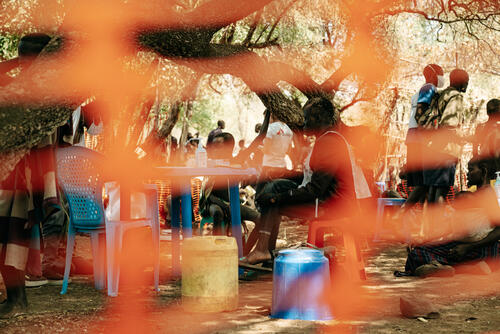
Challenges in curbing cholera outbreaks
Recent cholera outbreaks in the Horn of Africa have proven hard to contain and have required multiple coordinated responses to bring them under control. Public health systems are ill-equipped, lacking human resources, medical supplies and tools, while insecurity in the region impedes physical access to affected communities.
The fact that cholera is breaking out in so many locations simultaneously, and lasting for so long, makes it extremely hard to stamp out.
“Current cholera outbreaks in the Horn of Africa are among the longest outbreaks ever recorded in the region and there are multiple outbreaks happening at the same time,” says Samreen Hussain, MSF’s medical coordinator in Ethiopia. “While we are putting an end to one outbreak in one location, a new outbreak starts elsewhere.”
Environmental challenges are also an obstacle. Severe flooding in Somalia and Ethiopia has increased the risk of cholera outbreaks, contaminating water sources and contributing to unreliable water supplies and poor sanitation. Flooding has also made some cholera hotspots in the region much harder for aid agencies to reach.
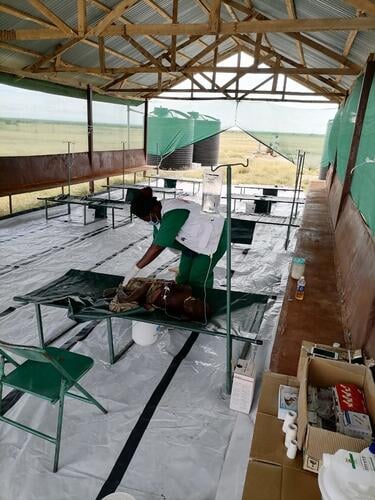
Mohamed Abdiwahab Omar, MSF nursing activity manager, describes his journey to reach a remote community in the Somali region of Ethiopia where a lethal combination of cholera and malnutrition had caused a number of recent deaths.
“In a convoy of four 4x4 vehicles, we set off from our project office in Jijiga towards Dawa zone, on the border with Kenya. For seven days we drove on dirt roads lined with animal carcasses through the drought-stricken region.
“On day three, heavy rains unleashed widespread flooding; roads and bridges were washed away, forcing us to find alternative routes. Our cars got repeatedly stuck in mud while attempting to cross riverbeds and had to be towed out, while the passengers had to alight and cross on foot to make the cars less heavy. We only made it there safely thanks to our skillful drivers.”
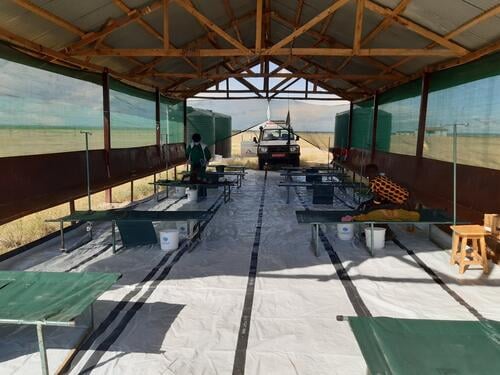
Funding shortfall
A further major challenge in preventing and responding early to disease outbreaks, including cholera, is the chronic shortfall of funding allocated to humanitarian response. In May 2023, international donors pledged just US$2.4 billion of the US$7 billion required for humanitarian assistance for people in the Horn of Africa affected by drought and conflict.
In Dadaab, a complex of refugee camps near Kenya’s border with Somalia, the funding shortfall has already caused a health catastrophe, with cholera spreading through the camps since November 2022, despite efforts to prevent the disease through vaccination and through educating people about ways to keep themselves safe.Without clean water and decent sanitation, these efforts are in vain, says Kelly Khabala, deputy medical coordinator of MSF’s work in Kenya.
“Despite coordinated health promotion activities and a cholera vaccination campaign done in February 2023, this outbreak cannot be controlled without the prioritisation of resources towards sustained preventative water, sanitation and hygiene interventions,” says Dr Khabala.
Despite efforts to prevent the disease through vaccination and educating people, without clean water and decent sanitation, these efforts are in vain.Kelly Khabala, MSF deputy medical coordinator in Kenya
“If sanitation is not improved in quality and scale, other epidemics, such as hepatitis E, will erupt in the camps at Dadaab,” says Dr Khabala. “This would particularly impact new arrivals and some of the older refugees in the blocks who have no access to latrines.”
Sustainable response to a chronic health problem
It is possible to prevent cholera by administering an oral vaccine to those at risk. However, the global surge in cholera cases has put a significant strain on the availability of vaccines. In any case, vaccination alone should not be seen as the solution.
To prevent and control cholera outbreaks, a multi-sectoral approach is needed, including surveillance, water, sanitation, hygiene, social mobilisation, treatment and vaccination, with priority given to improving people’s access to safe drinking water, proper sanitation and hygiene.
Today, MSF calls for urgent action to be taken to improve people’s access to clean water and decent sanitation. It is critical that action is taken now to reduce the burden of cholera, both within the Horn of Africa and globally, before the death toll from this preventable disease rises even further.



